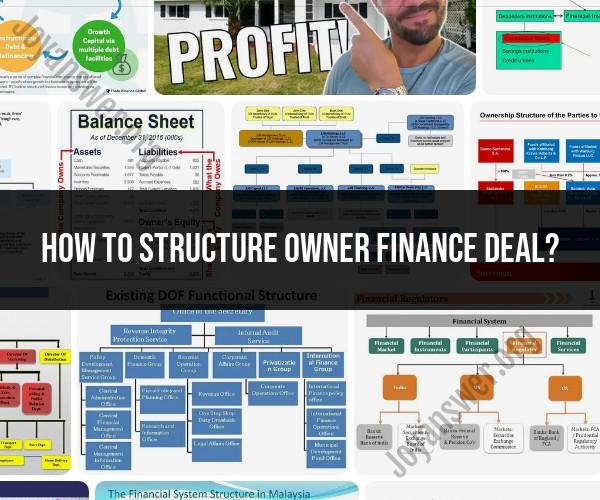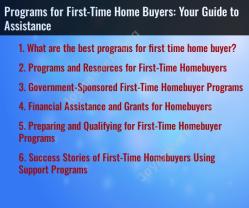How to structure owner finance deal?
Structuring an owner finance deal involves setting the terms and conditions under which a property is sold with the seller providing financing to the buyer. This can be a flexible and creative way to facilitate real estate transactions, but it's essential to ensure that the deal is structured properly to protect the interests of both parties. Here are some best practices for structuring an owner finance deal:
Agree on the Sale Price:
- The buyer and seller should agree on a sale price for the property. This price should be based on a fair market appraisal and be acceptable to both parties.
Down Payment:
- Determine the amount of the down payment the buyer will make. A typical down payment ranges from 10% to 20% of the purchase price. A higher down payment may provide more security for the seller.
Interest Rate:
- Decide on the interest rate for the owner-financed portion of the purchase. The interest rate should be competitive with current market rates and should be clearly stated in the agreement.
Loan Term:
- Establish the length of the loan term. Common owner finance terms range from 3 to 30 years. The term should be agreed upon and documented in the contract.
Monthly Payments:
- Determine the amount of the monthly payments, including principal and interest. These payments should be affordable for the buyer, and the payment schedule should be clearly outlined.
Balloon Payment (if applicable):
- In some owner finance deals, a balloon payment may be included. This is a larger, lump-sum payment due at the end of the loan term. The terms of the balloon payment should be clearly defined in the agreement.
Title and Ownership:
- Specify how the title and ownership will be transferred. Typically, the buyer takes possession of the property while the seller retains the title as security until the loan is paid off.
Default and Remedies:
- Address what happens in case of default. Define the conditions under which the seller can reclaim the property and the process for resolving default issues.
Legal Assistance:
- Consider seeking legal counsel to draft the owner finance agreement. Real estate transactions can be complex, and an attorney can help ensure that the contract complies with local laws and regulations.
Credit Check and Due Diligence:
- Conduct a thorough credit check and due diligence on the buyer to assess their ability to make payments. The seller may also want to request references or additional financial information.
Insurance and Property Taxes:
- Clarify who is responsible for property taxes and homeowner's insurance. These expenses should be accounted for in the monthly payments.
Record the Agreement:
- It's essential to record the owner finance agreement with the appropriate local government authority to protect the interests of both parties and establish a legal claim on the property.
Consult a Financial Advisor:
- Buyers and sellers may benefit from consulting with a financial advisor or tax professional to understand the financial implications and tax consequences of the owner finance deal.
Document Everything:
- Ensure that all aspects of the deal, including the terms, conditions, and obligations of both parties, are documented clearly in a written contract that is signed by both parties.
Stay Compliant with Laws:
- Be aware of and comply with all local, state, and federal laws governing owner financing and real estate transactions. Laws may vary by jurisdiction.
Structuring an owner finance deal should be done with careful consideration and attention to detail to protect the interests of both the buyer and seller. Seeking professional guidance and legal advice is often advisable to navigate the complexities of such transactions.













